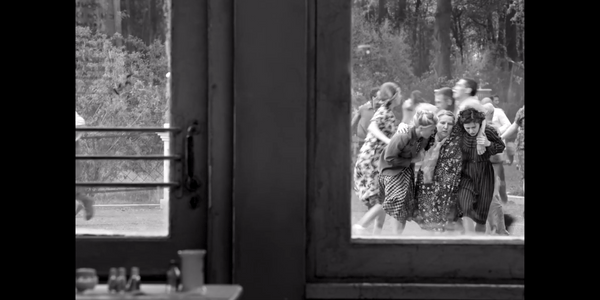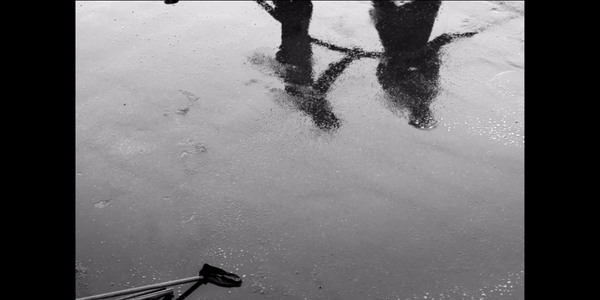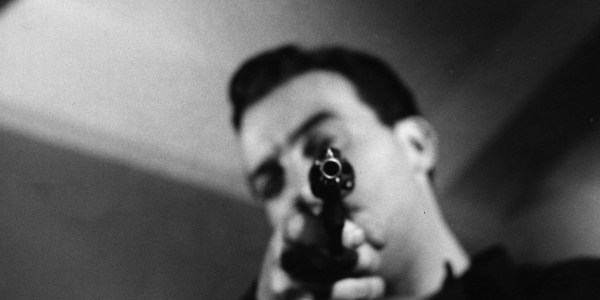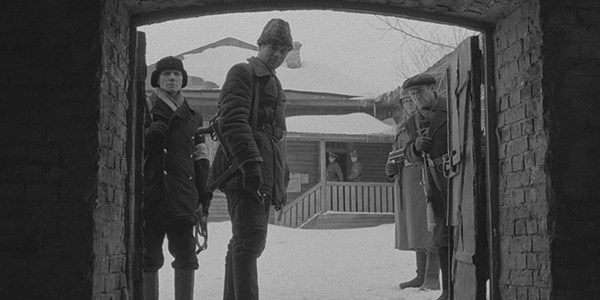DEAR COMRADES: A Political Moment, Filtered And Paved
In an interview with Deadline, director Andrei Konchalovsky spoke about how his main actress in Dear Comrades!, Julia Vysotskaya, was born in Novocherkassk a decade after the movie’s central massacre took place, giving her an indirectly personal relationship to the material. Konchalovsky prides himself on authentic historical representation and this was but one example of his conscious depiction of that era of Soviet Russia. The grounded nature of the film, which offers a litany of the political talking points of the time and a very detailed demonstration of the bureaucratic nature of the Communist Party’s vast, overarching chain of command, is a narrative play-acting as a documentary. What keeps Dear Comrades! from being a ‘great’ film however is that its dedication to such muted authenticity leaves it as a porcelain relic that remains resistant to malleability as a living work of art.
An Authentic Recreation of Soviet Russia….
The film begins with Lyuda Syomina (Julia Vysotskaya), a very trusted high-up member of the Communist Party who is very much in line with the ‘cause’. She argues with her daughter Svetka (Yulia Burova) about communism and socialism, her daughter considering the idea that Russia has since strayed away from its roots of true workers liberation into an authoritarian oligarchical hybrid society. When the Party announces that food prices are going to be rising, a group of workers plan and perform a demonstration. Lyuda finds herself on the opposite side of the fence from her daughter. The demonstration eventually erupts into violence unilaterally caused by the armed military who proceed to shoot protestors who are deemed to raucous. Once Lyuda realizes that her daughter was in the demonstration she goes on a frantic search to confirm she is still alive.

The film’s political lens takes us through a slow conversion by Lyuda, a Party loyalist into someone who becomes disillusioned and understands the grave moral atrocity in which she is complicit in. While the movie’s real dispelling of history and depth of tidal changes over the decades in Russia are only touched on in the muted conversation, it manages to at least put us in the moment with an engrossing sense of space and tension. This is mostly credited to cinematographer Andrey Naydenov, who shoots with a deep understanding of space and its role in creating danger and tension. One of the movie’s best shots is from inside of an empty hair salon where the camera points out the window to people frantically running around as gunshots fire. We see Lyuda ducking and dodging and eventually grabbing someone to take them into the shop.
…. with a Frustrating Lack of Depth
Once in the shop, however, one of the characters leans by the window and gets shot through the throat anyway, and dies. No space is safe. Another scene shows silhouetted reflections of two street workers who are seen upside down as they wash the blood off the streets. Konchalovsky’s movie has a few stark moments like this peppered here and there but they generally serve as occasional forceful taps on the shoulder of the dangers of “power and autocracy”. Most of the movie however is consisted of Lyuda whiling away inside of an apartment with her father (Sergei Erlish) who was of the Kossack army regiment in the early 20th century or meeting with a government agent who gives her leads on her daughter.

While the details and historical recreations are impeccable, Dear Comrades! remains emotionally unmoving. Lyuda’s slow change of positioning in the movie doesn’t captivate a thorough understanding of the moment or its history despite the film being technically historically accurate. The issue here lies in the ways that Konchalovsky chooses to dispel a political lesson without giving proper weight to the relationship of mother and daughter.
Their core political differences at the beginning of the movie are interrupted by the disappearance of Svetka, but there’s no reconciling the complex state of the Soviet apparatus at the time. Arguments between what Lenin or Stalin wanted versus what has resulted under the rule of Khrushchev are important discussions that remain at the heart of the Novocherkassk protests. Instead, what we get is a generic tale of overreach and brutality of government apparatus. If historical authenticity was Konchalovsky’s core intent, then it’s strange how satisfied the film is, like the Soviet army, to simply pave over the arguments.
Dear Comrades! released in U.S. virtual cinemas and streaming on February 5th, 2021.
Watch Dear Comrades!
Does content like this matter to you?
Become a Member and support film journalism. Unlock access to all of Film Inquiry`s great articles. Join a community of like-minded readers who are passionate about cinema – get access to our private members Network, give back to independent filmmakers, and more.
Join now!





